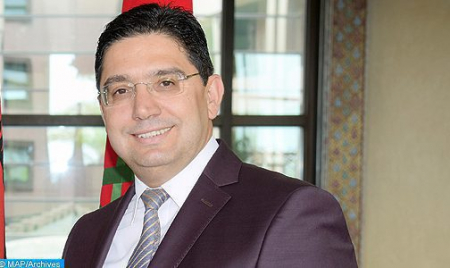Inclusive Democratic Participation, Tool for Combating and Preventing Violent Extremism – FM –
Inclusive democratic participation represents a tool in the fight and prevention against violent extremism, underlined, Wednesday in Rabat, the Minister of Foreign Affairs, African Cooperation and Moroccans Abroad, Nasser Bourita. “Inclusive democratic participation today represents not only a tool for the promotion and improvement of democracy, but also a means of combating and preventing violent extremism”, said Mr. Bourita in a speech at the opening of a global conference on inclusive democratic participation to prevent and counter violent extremism. The minister, who stressed the need to join efforts to strengthen cohesion and help local stakeholders consolidate their resilience in the face of conflicts and divisions, said that it is not enough to fight against violent extremism but it must also be prevented. Indeed, he explained, this prevention requires the implementation of several tools, including the empowerment of young people and the promotion of education, the integration of women in initiatives to fight against violent extremism and the contribution of the media and social media in preventing violent extremism. After highlighting the threat that violent extremism poses to young people, “privileged targets of recruitment strategies”, Mr. Bourita warned that security responses were insufficient, as they do not tackle the many factors that fuel violent extremism and lead this category to rally to violent extremist groups. Faced with such threats, the minister underlined the importance of the “soft power” of quality, relevant, inclusive and equitable education, as well as the imperative to integrate a gender perspective into prevention initiatives. Bourita also stressed, in this regard, the need of the full participation of women in the process of decision-making in matters of security as well as the essential role of the media and social media in prevention against violent extremism, especially among young people. Regarding the efforts made by the Kingdom to fight against violent extremism, Mr. Bourita noted that Morocco has put in place an ambitious policy to combat this scourge, having contributed in the medium and long terms to a inclusive democratic participation. Morocco, thanks to a strong policy led by HM King Mohammed VI, has made the consolidation of democracy, and more particularly inclusive democratic participation, the cornerstone of building a modern and democratic society. The Kingdom’s deep conviction is that there could be no development without stability and stability without democracy, he pointed out. Also, the several reforms undertaken within the framework of the Royal Vision on the constitutional, legislative and regulatory levels all converge towards the achievement of an inclusive democratic participation, more particularly of women and young people, he said. “Our country is in the process of finalizing its first National Action Plan on Women, Peace and Security, in application of Security Council resolution 1325 and on the basis of an inclusive and participatory approach involving all the Ministerial Departments concerned,” the minister added. This action plan is intended to be a real transformation tool aimed at channeling efforts to strengthen the resilience of women in the face of emerging threats in an environment that is increasingly complex at the regional and international levels, he explained. This action plan will serve, according to Mr. Bourita, as a framework for policy convergence in the fields of preventive diplomacy, mediation, peacekeeping, the promotion of a culture of peace and equality and economic participation of women. Morocco’s dynamic process of human rights and democratic reforms continues to help prevent violent extremism and radical rhetoric, he said. The Global Conference on inclusive democratic participation to prevent and counter violent extremism kicked off Wednesday in Rabat in hybrid mode. Organized by the Ministry of Foreign Affairs, African Cooperation and Moroccans Abroad, in cooperation with the Permanent Secretariat of the Community of Democracies (PSCD), the Rabita Mohammadia of Ulemas, and the National Human Rights Council, the Conference aims to provide a platform to discuss challenges and good practices in preventing and countering violent extremism (P/CVE) through inclusive democratic participation. The opening session of this two-day meeting was attended by the President of the National Human Rights Council, Amina Bouayach, and the Secretary-General of the Community of Democracies, Thomas E. Garrett, and with the participation, virtually, of the Romanian Minister of Foreign Affairs, Bogdan Aurescu, and the Secretary-General of the Rabita Mohammadia of Ulemas, Ahmed Abbadi.

